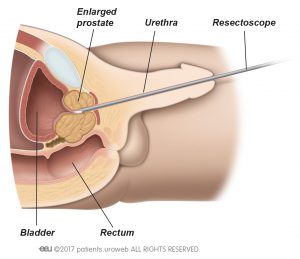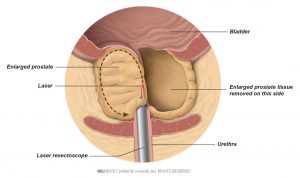Table of Contents [hide]
- 1 What is laser enucleation?
- 2 When should I consider laser enucleation of the prostate?
- 3 How is laser enucleation of the prostate performed?
- 4 How do I prepare for the procedure?
- 5 How long will it take me to get back to my daily activities?
- 6 Advantages of laser enucleation
- 7 Disadvantages of laser enucleation
What is laser enucleation?
Laser enucleation is a common treatment option for BPE. The laser uses intensive light to cut the prostate tissue. At the same time, the heat from the laser is used to close blood vessels. This is why only a small amount of blood is lost during this type of surgery.
Laser enucleation can be done with different laser systems. The choice of the laser depends on the expertise of your doctor and what is available in your hospital.
When should I consider laser enucleation of the prostate?
If your prostate is over 80 millilitres, laser enucleation may be the best option for you, because it removes the enlarged part of the prostate. This type of surgery is also a good option for men with smaller prostates.
Laser enucleation is suitable for men who take blood-thinning medication for other conditions. It is important to discuss your individual situation with your doctor.
How is laser enucleation of the prostate performed?
For laser enucleation, you will receive general, spinal, or intravenous anaesthesia. Once you are under anaesthesia, the doctor uses a laser resectoscope to enter your bladder through the urethra without making an incision in your lower abdomen (Fig. 1). The resectoscope has a small camera through which the doctor can see the prostate.
During laser enucleation, the doctor uses the laser to cut prostate tissue, and in this way, the enlarged prostate can be treated (Fig. 2). The doctor then uses an instrument known as morcellator to flush the cut tissue out of your body through the bladder and the urethra.
After the operation, a urinary catheter is placed in your bladder to drain urine. It is also used to continuously flush your bladder and urethra with a sterile solution to prevent blood clots. You will need the catheter for some days until the urethra is healed and you can urinate on your own.
How do I prepare for the procedure?
Your doctor will advise you in detail about how to prepare for the procedure. You must not eat, drink, or smoke for 6 hours before surgery to prepare for the anaesthesia. If you are taking any prescribed medication, discuss it with your doctor. You may need to stop taking it before surgery.
How long will it take me to get back to my daily activities?
Usually, you can leave the hospital 1 or 2 days after surgery. The length of hospital stay can vary in different countries. Your urine may contain some blood and you may feel pain when you urinate. This can last up to several weeks.
For 4-6 weeks after the surgery:
- Drink 1-2 litres every day, especially water
- Do not lift anything heavier than 5 kilograms
- Do not do any heavy exercise and avoid bike riding
- Do not take thermal baths or go to the sauna
- Prevent constipation by adapting your diet
- Discuss any prescribed medication with your doctor
Avoid having sex for 2-3 weeks. After laser enucleation, you may suffer from retrograde ejaculation. This is a chronic condition where semen can no longer leave through the urethra during orgasm. Instead, it goes into the bladder and later leaves your body during urination.
You need to go to your doctor or back to the hospital right away if you:
- Develop a fever
- Are unable to urinate on your own
- Have heavy blood loss or pain



